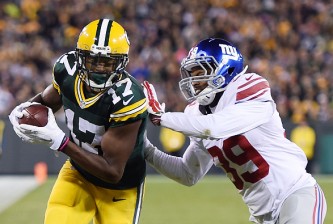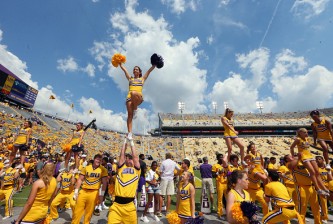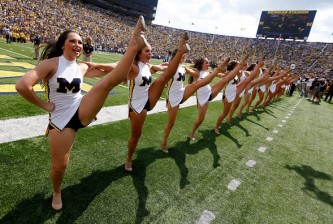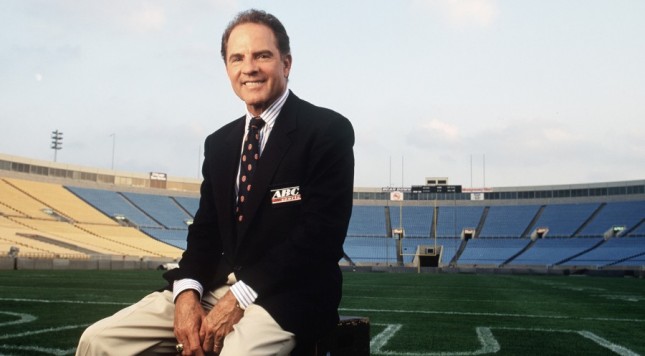Editor’s Note: A version of this article originally appeared on Awful Announcing.
To football fans in their 70’s and 80’s, Frank Gifford was known as a very good football player who first was in college at USC, then was both on offense and defense with the New York Football Giants.
For sports fans ranging in age from their 30’s to their 50’s, Gifford was a broadcaster who was synonymous with Monday Night Football first as a play-by-play man then as an analyst, a host on ABC’s Wide World of Sports, an Olympics host and a man who could call a multitude of sports.
Frank Gifford died Sunday of natural causes at the age of 84, just a week shy of his 85th birthday. His playing career with the Giants, the only team he played for, landed him in the Pro Football Hall of Fame in 1977. His broadcasting career was also honored with a Sports Emmy in 1977 and by the Pro Football Hall of Fame with the Pete Rozelle Award in 1995.
Gifford had an outstanding playing career. But even though Giants fans knew him from his days playing in big games including the 1958 NFL Championship Game vs. the Baltimore Colts which made the league into the perfect television sport, Gifford was known for this hit by Philadelphia Eagle Chuck Bednarik, a hit so vicious that it knocked Frank out of the league for one year:
CBS SPORTS
Gifford began his broadcasting career with CBS as an NFL analyst. He was at the Ice Bowl which pitted Dallas and Green Bay at a very cold Lambeau Field in 1967 and he was the analyst on Super Bowl I partnering with Ray Scott and Jack Whitaker. In addition to the NFL, CBS utilized him on golf where he called The Masters for three years. Jim Nantz paid tribute to Gifford during the Bridgestone Invitational final round on Sunday:
One of Gifford’s last events for CBS was the NFC Divisional Playoff game between the Detroit Lions and Dallas Cowboys. Gifford’s play-by-play partner was the late Frank Glieber:
ABC SPORTS
In 1971, ABC lured Gifford away from CBS on the promise he would call play-by-play not just on football but on other sports as well. Gifford expanded his portfolio with the Olympics and Wide World of Sports.
MONDAY NIGHT FOOTBALL
Gifford began his career on Monday Night Football partnered with Howard Cosell and Don Meredith. Here’s Gifford’s debut which was a preseason game between the Kansas City Chiefs and New York Jets. Gifford gets the microphone from Howard at the five minute mark. The original MNF theme is quite funky.
By 1973, Gifford, Howard and Dandy Don had become household names and the MNF intro incorporated them into the opening:
The trio would work together until 1973 when Meredith left for NBC. Gifford and Cosell would be joined at first by Fred Williamson who was fired in the 1974 preseason and subsequently replaced by Alex Karras. Meredith would return for the 1977 season and remained on MNF until Super Bowl XIX.
Monday Night Football’s viewership was so big in the 1970’s that movie theaters and restaurants complained that the series affected their businesses with people staying home to watch the games. On December 9, 1980, MNF reported the news of John Lennon’s killing to most of America. This clip from ESPN’s Outside the Lines chronicles how Howard Cosell grappled on whether to report the news, but it was Gifford who convinced Cosell to go forward:
By 1984, Cosell had left MNF. Don Meredith was in his last year and O.J. Simpson had joined the broadcast team. Here’s a Week 16 matchup between the Dallas Cowboys and the Miami Dolphins. By this time, Gifford became the focus of the broadcast.
Super Bowl XIX was the only Big Game which Gifford called the play-by-play. He worked with his friend, Don Meredith (which would be his last game before leaving the booth altogether) and DC NFL Team quarterback Joe Theismann who made his television debut on ABC. The entire ABC broadcast of the game is below.
Gifford was the glue in the broadcast booth calling play-by-play with multiple partners including Fran Tarkenton, Joe Namath and Simpson before ABC Sports decided to make a change in the booth for the 1986 season by making Gifford the analyst and bringing in Al Michaels to call the games.
In 1987, ABC hired Dan Dierforf to be a second analyst and Monday Night Football would become a three man booth once again. This trio worked together until 1997 calling three Super Bowls (XXII, XV and XXIX) as well as the second game of the AFC-NFC Saturday Wild Card doubleheader along with their schedule of Monday Night games. Here’s the MNF open in 1988 which is known as the “Pinball Machine Intro” for obvious reasons:
Gifford’s last season on Monday Night Football was in 1998.
OLYMPICS
Gifford’s first Olympic assignment was in 1972 in Munich. Gifford was at the mic for the controversial USA vs. USSR final.
Gifford also called skiing for ABC partnering with Bob Beattie for iconic calls of Franz Klammer’s gold medal run in the downhill in the 1976 Innsbruck Winter Olympics and again in 1984 calling Bill Johnson’s winning downhill run at Sarajevo.
Gifford was also a studio host during the ABC Olympic era often manning the late night desk and sometimes hosting weekends. Here’s a clip from the 1984 Los Angeles Games on the last day of the Olympics with Kathleen Sullivan:
For ABC’s last Olympics in Calgary in 1988, Gifford co-hosted the late night studio with his wife, Kathie Lee. Unfortunately, we don’t have a clip for you. Suffice to say, it had to be seen to be believed.
WIDE WORLD OF SPORTS
Gifford called a number of events for ABC’s sports anthology program including the Harlem Globetrotters which were a regular staple of the show. But on Wide World, he was most identified with daredevil Evel Knievel who made appearances throughout the 1970’s. In this clip of an anniversary show from the late 1980’s, Gifford interviews Knievel about his jumps over double decker buses, the Snake River Canyon and tractor trailers.
Gifford was loyal to ABC throughout his tenure at the network. He also filled in on Good Morning America where he met his wife, Kathie Lee and they got married in 1986.
END OF CAREER
After ESPN took over ABC Sports, management decided to phase out Gifford from Monday Night Football. It first took him out of the booth after the 1997 season and placed Gifford on the Monday Night Blitz pregame show with Chris Berman in 1998. The show was based at the ESPN Zone sports bar in Baltimore where Gifford would introduce one segment and go home. It was embarrassing to see Gifford treated in that manner after 27 years at the network.
Gifford didn’t work regularly in sports broadcasting again, except for making occasional appearances during ESPN Classic’s SportsCentury series and in various interviews. But he found himself tapped by ESPN one more time for the final Monday Night Football game on ABC in 2005 by appearing on the open with Don Meredith and Al Michaels:
For the 40th season of MNF, ESPN asked Gifford to voice some halftime vignettes and producer Jay Rothman says Frank’s voice will be used this season.
Gifford is survived by his wife Kathie Lee, their two children, three children from his first marriage and five grandchildren.
Bob Iger, the CEO of Disney issued this statement on Sunday:
“Frank Gifford was an exceptional man who will be missed by everyone who had the joy of seeing his talent on the field, the pleasure of watching his broadcasts, or the honor of knowing him. His many achievements were defined by a quiet dignity and a personal grace that is seldom seen in any arena; he truly embodied the very best of us. Frank’s contributions to ABC Sports and our company are immeasurable. We are honored to call him a Disney Legend and I am very fortunate to have called him a dear friend and colleague. Our thoughts and prayers are with his family at this difficult time.”
Michaels paid tribute to Gifford at halftime of last night’s Hall of Fame Game:
Gifford’s stamp on sports television lives on with Monday Night Football as well as on the Olympics.























